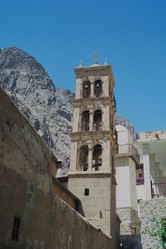The key to understanding communication between God and humans is the Holy Spirit, the third person of the Trinity. It is an important Christian teaching that those blessed by accepting Jesus into their lives are endowed with the gift of the Holy Spirit, the indwelling power of God in their hearts and minds. This Spirit is the Spirit of Jesus and is the means by which the risen Lord is present in his community and in believers' souls.
The role of the Spirit is to be the moral force that drives the Christian life, animating Christians to goodness and to overcome the weaknesses of their nature, which otherwise would be too much for us to deal with. The Spirit is the means by God communicates with his people, for it is a source of inspiration. Initially given at baptism, it is accessed through prayer and the sacraments, regular performance and reception of which empower the Christian life.
But does the Spirit speak in voices? I am not going to dogmatically say yes or no, but it does not do so in audible voices that can be heard by the public, and most who "hear" voices agree that they are not uttered by any physical, bodily source. But it is clear that many Christians believe that the Spirit speaks to them, delivering messages about their lives and God's direction and will for them. But what I think is happening is not that an audible voice is heard, but that God through the Spirit inspires ideas in the minds of the recipient. These are what the philosopher Descartes might class as adventitious ideas, ideas that come to you from outside. But humans are creatures who think in language and so even though these ideas are not uttered in any human language, the human mind linguistically expresses them in a language that it can understand. I am aware that there are people who talk in tongues, but this is a phenomenon that baffles me and for which I cannot give an explanation. Thus I expect that if God wants me or anyone else for that matter to receive a communication He will inspire me with ideas, but my brain will render them in English.
It is also important to say that for many Christians God communicates through the medium of rituals, works of art and music. Here you cannot separate the medium from the message. A person listening to the beauties of Gregorian chant, Catholic ritual music, may feel that the melody is a vehicle through which the influence of God shines. You may also feel that God's communication is often experienced through the profundity of silence, which is as much a medium as art is.
Thus Joy Behar's supposed joke about the vice president's sanity is not only offensive, but reflects a limited and unsophisticated understanding of Christian thought and religious experience








 Darkness over the Earth the skies darkened when Jesus was crucified15 days ago
Darkness over the Earth the skies darkened when Jesus was crucified15 days ago
 TheThousand Year Gardenon 11/26/2025
TheThousand Year Gardenon 11/26/2025
 Women of the Gospelson 10/11/2025
Women of the Gospelson 10/11/2025
 Religious Gardenson 08/25/2025
Religious Gardenson 08/25/2025



Comments
No specific details are known about the end. My attitude is that I do not know when the end will come, but as I am 73 if it does not come in the next few years I will not be here. So why be too bothered about it.
Your comment below about natural events as harmful or as helpful caused me to consider world ends.
A comment elsewhere, again in answer to previous observations and questions of mine, designates from Christian tradition fire as world-ending.
Does that tradition describe world-ending fire as from bombs, gas explosions, lightning or meteor strikes, pyromania, spontaneous combustion, volcanic eruptions or wildfires?
We distinguish between natural events, which can be harmful but are part of nature, like a volcano, and moral evil, which arises from human vice.
Thank you for your comment below in answer to my previous observation and question and in correction of my misdescription.
Yes, I agree that "excessively, extremely humid, muggy" weather cannot be evil even as it continues God's creation and creates life-friendly moisture (and pretty complexions ;-D).
I think that places can have a dark, unpleasant atmosphere. Comparing it to a dull muggy day might have poetic value, but such a day is not evil, as it is part of God's creation, so the metaphor is not fully apt.
Thank you for your comment below in answer to my previous observations and questions.
Such beautifully liminal, thin-veiled places as Knock cause me reluctantly to consider their opposites.
Could it be possible to describe a religiously, spiritually non-friendly place as heavy-, thick-veiled?
What might that be like, like an excessively, extremely humid, muggy day?
This is a houghtful bit of original thinking in religion. Yes, you are right, there is no suitable verb.for what you want to say. We need to reflect on this carefully.
Thank you for your comment below on March 2, 2018, in answer to my previous, same-day observations and question.
Elsewhere, you describe liminal places as those with religious-, spiritual-friendly, thin-veiled air.
No one from the Holy Trinity did any speaking there, at my favoritest Marian site.
But I fail to find one verb that gives us what that site generated. Elsewhere, we always have the sound, the spoken, the vocal guidance.
Is there one verb that invokes what the Knock miracle involved?
Thank you Derdriu.
My wife's mother's family derive from near Knock, though my wife herself was born in England. She is very close to her cousins and last remaining aunt who live in the general area around Knock. I love the Knock hymn, it is so beautiful.
Frank, Thank you for the appreciation of my comment. Somehow I missed your comment the first time around. But now that I'm going through your articles, checking to see that I've read them all, I see this.
It's a particularly lovely appreciation since Knock is one of my favorite Marian appearances and this is one of my favorite wizzleys by you.
Your wife must feel so blessed being from the Knock area.